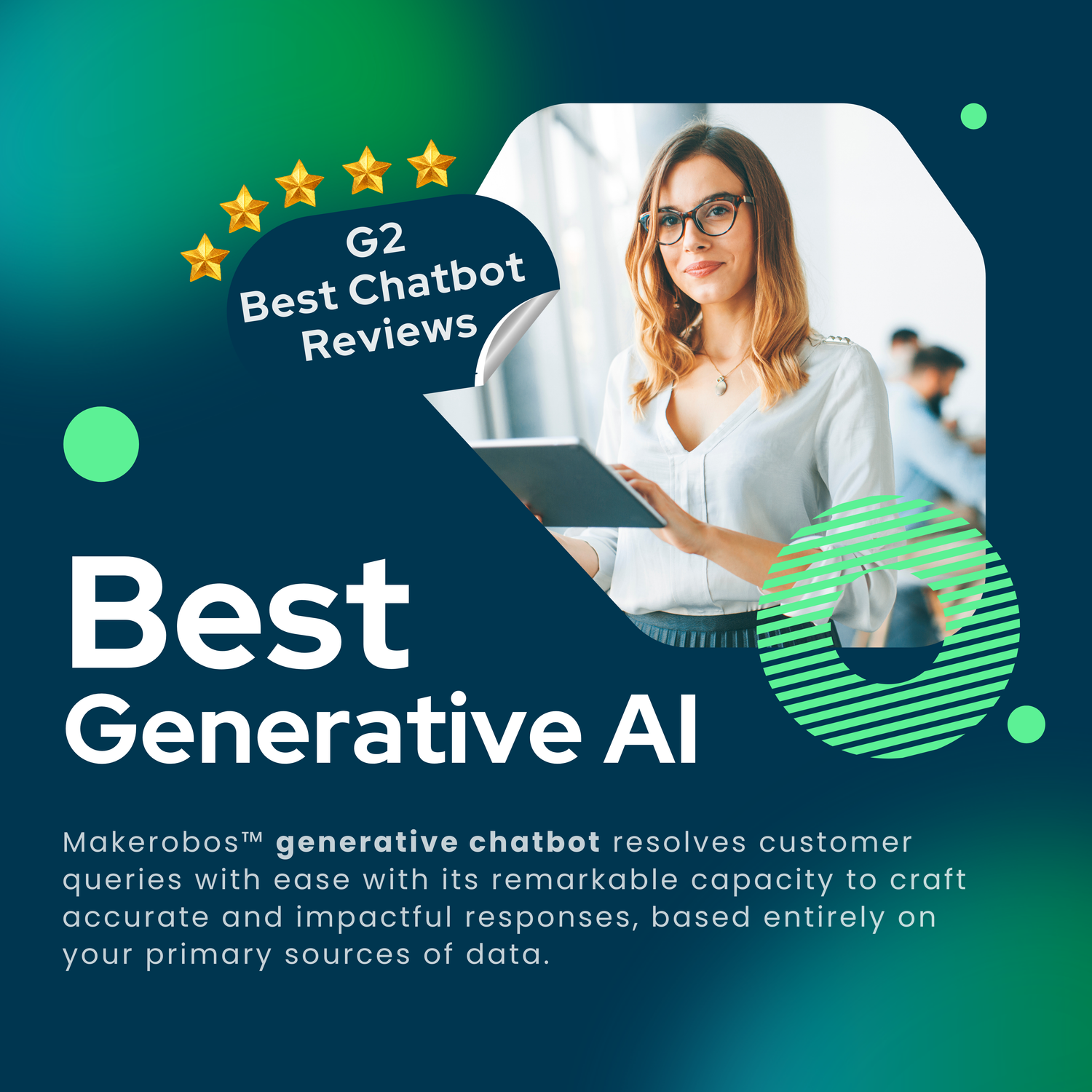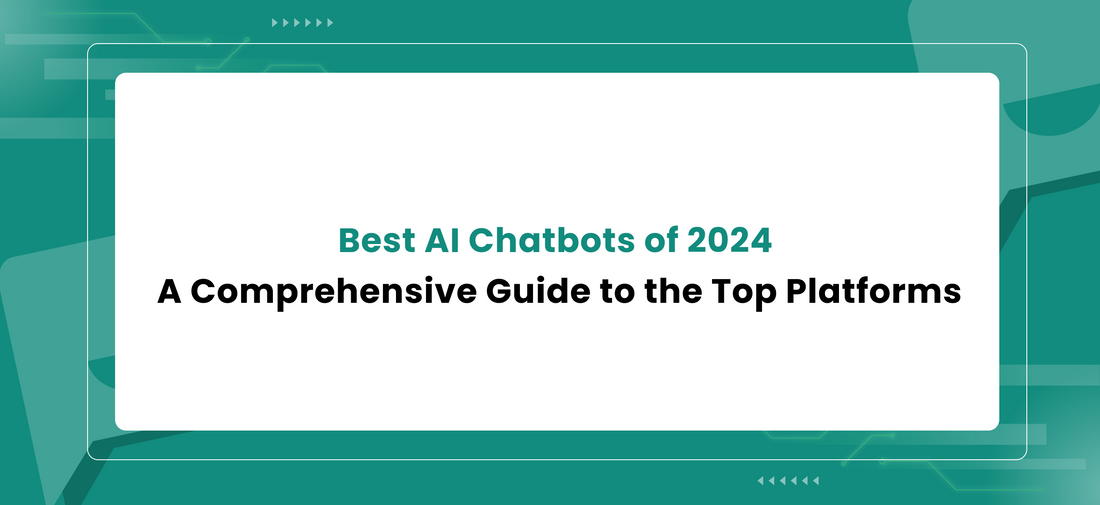Introduction
Artificial Intelligence (AI) chatbots are transforming the way businesses engage with their customers. By automating routine tasks, providing instant responses, and enhancing customer experience, AI chatbots have become indispensable for businesses of all sizes.
Over the past few years, platforms like ChatGPT, Google Bard, and Makerobos Frontman have emerged as industry leaders, offering powerful AI solutions for customer service, marketing, and sales. In this guide, we will review the best AI chatbots of 2024 based on factors such as ease of use, integration options, customization, and AI capabilities.
Whether you're a small business owner looking for an affordable chatbot solution or a large enterprise seeking advanced AI tools, this guide will help you find the right chatbot for your needs.
Criteria for Selecting the Best AI Chatbots
When choosing the best AI chatbot for your business, it's important to consider several key factors. Below are the criteria we used to evaluate the top platforms:
- Ease of Use: How simple is it to set up and operate the chatbot, especially for non-technical users?
- Customization: Can you tailor the chatbot's design, behavior, and responses to fit your brand?
- Integration Options: Does the platform support integrations with CRMs, marketing automation tools, and other third-party software?
- Pricing: Are there free versions or affordable pricing models available for small businesses?
- AI Capabilities: Does the platform offer advanced natural language processing (NLP), machine learning, or adaptive learning features?
- Use Cases: Is the chatbot suitable for specific industries like eCommerce, customer support, or lead generation?
Top AI Chatbots of 2024
1. ChatGPT (OpenAI)
Overview
ChatGPT is one of the most widely known and advanced AI chatbot platforms, developed by OpenAI. It leverages the powerful GPT-4 model, which has been trained on vast amounts of text data from diverse sources. The platform is celebrated for its ability to generate human-like conversations that are contextually aware, making it highly effective for various business applications like customer support, content creation, and even technical troubleshooting.
ChatGPT has rapidly gained traction due to its capacity to understand nuanced queries, provide detailed explanations, and even carry out complex conversational tasks. As a result, it’s been adopted across industries, from customer service to educational tutoring and beyond.
Key Features
- State-of-the-art Natural Language Processing (NLP): ChatGPT excels in understanding and generating human-like responses, offering an unparalleled conversational experience.
- Custom Instructions: Users can now provide custom instructions, allowing for a more tailored experience based on specific needs or industry requirements.
- Multi-turn Conversations: ChatGPT can remember and reference past interactions within a conversation, making it capable of more coherent and contextual dialogues.
- Expansive Knowledge Base: Powered by GPT-4, ChatGPT can generate highly informative responses on a wide range of topics, including technical queries and industry-specific advice.
Use Cases
- Customer Support: Automates responses to common customer queries, freeing up human agents to handle more complex or sensitive issues.
- Content Creation: Used for generating blog posts, product descriptions, and even creative writing.
- Lead Generation: Engages potential customers by answering questions and guiding them through the sales funnel.
- Education: Provides tutoring and answers complex academic queries in subjects like math, science, and literature.
Pros
- Industry-leading conversational capabilities.
- High-level customization through custom instructions.
- Ability to handle multi-turn conversations seamlessly.
Cons
- May generate "hallucinations" (incorrect information) if not properly trained or supervised.
- Requires a paid plan for advanced features, making it expensive for large-scale implementations.
Pricing
- Free tier available with limited access.
- Pro Plan: $20/month for faster response times and priority access to new features.
2. Google Bard
Overview
Google Bard is Google’s entry into the generative AI chatbot space, offering powerful conversational abilities thanks to its integration with Google's extensive AI infrastructure. Like ChatGPT, Bard is a large language model (LLM) designed for natural language understanding and generation. Bard is particularly useful for businesses already embedded within the Google ecosystem, as it seamlessly integrates with other Google apps like Gmail, Google Drive, and Google Calendar.
Bard's main strength lies in its real-time learning capabilities and contextual understanding, making it ideal for dynamic environments where information needs to be processed and responded to quickly.
Key Features
- Integration with Google Workspace: Seamless integration with Google’s suite of apps, making it easy for businesses to automate workflows and streamline operations.
- Advanced Language Processing: Built on Google's large language model (PaLM 2), Bard can understand complex queries and generate detailed, context-aware responses.
- Real-Time Information Retrieval: Bard is connected to the internet, allowing it to fetch real-time information, unlike some static models that rely solely on training data.
- Voice and Text Capabilities: Offers both text-based and voice-enabled interactions, catering to various user preferences.
Use Cases
- Internal Business Automation: Automates scheduling, meeting coordination, and information retrieval within the Google Workspace ecosystem.
- Customer Support: Handles customer inquiries, FAQs, and live chat using real-time information.
- Marketing: Generates content for marketing campaigns, including social media posts, ad copy, and email marketing.
- Education and Research: Assists in research by providing updated information and generating summaries.
Pros
- Native integration with Google apps.
- Powerful real-time data retrieval capabilities.
- Voice and text-based interaction modes.
Cons
- Limited customization compared to other platforms.
- Better suited for businesses already using Google Workspace.
Pricing
- Free to use, with paid features possibly being introduced for advanced functionalities in the future.
3. Makerobos Frontman
Overview
Makerobos Frontman is an AI-powered chatbot platform designed for businesses that want to automate and personalize their customer interactions without needing technical expertise. What distinguishes Makerobos is its focus on Instinct AI, a module that allows the chatbot to continuously learn from user behavior, improving response quality over time.
Makerobos is known for offering a no-code or low-code interface, which allows businesses to customize their chatbots quickly and easily. Whether you're looking to streamline customer support, increase lead conversion, or drive personalized marketing campaigns, Frontman is an excellent choice. It offers deep integration options, making it a versatile solution for businesses across various industries, from eCommerce to real estate.
Key Features
- Instinct AI: Makerobos' proprietary AI module allows the chatbot to learn and adapt over time, making responses more accurate and personalized.
- No-Code Customization: Users can easily modify the chatbot’s appearance, behavior, and conversation flow without writing code, thanks to its intuitive drag-and-drop interface.
- Rich Messaging: Supports multimedia content, including images, videos, and clickable buttons, enhancing user engagement.
- Omnichannel Support: Makerobos enables businesses to deploy their chatbot across multiple channels, such as websites, mobile apps, and social media platforms.
- Integration with Major CRMs and Tools: Seamlessly integrates with platforms like Salesforce, Shopify, HubSpot, and more.
Use Cases
- eCommerce Customer Support: Frontman excels in guiding customers through the purchase journey, answering questions, and recommending products.
- Lead Generation: Automatically engages with website visitors and collects data to nurture potential leads.
- Marketing Campaigns: Automates personalized marketing messages, delivering the right content to the right audience at the right time.
- Self-Serve Knowledge Base: Empowers customers to find answers to their queries without needing live agents, reducing support ticket volume.
Pros
- Intuitive customization: Perfect for non-developers, thanks to its no-code interface.
- Instinct AI: Provides an evolving chatbot experience that becomes more accurate and insightful over time.
- Robust integration options: Works with major business tools like CRMs, payment gateways, and eCommerce platforms.
Cons
- May require onboarding and training to fully utilize all advanced features.
Pricing
- Free tier available with basic features.
- Paid plans start at $50/month with advanced options for larger businesses and enterprises.
Real-World Usage
Makerobos has proven particularly effective for eCommerce brands looking to automate customer service and drive conversions through personalized, AI-powered interactions.
4. Drift
Overview
Drift is a conversational marketing platform that focuses on converting website visitors into leads by engaging them in real-time. Drift leverages AI chatbots to offer personalized experiences based on visitor behavior, helping businesses to capture leads, book meetings, and provide instant support.
Drift is highly specialized for sales and marketing use cases, making it ideal for businesses that prioritize lead generation and sales automation. With its deep CRM integration capabilities, Drift helps sales teams streamline their workflows and close deals faster.
Key Features
- AI-Driven Lead Qualification: Drift’s chatbot can automatically qualify leads based on predefined criteria, helping sales teams focus on high-potential prospects.
- Conversational Landing Pages: Drift enables businesses to create conversational landing pages, where chatbots engage visitors and guide them toward desired actions.
- Playbooks: Users can set up automated workflows (or "Playbooks") for various scenarios, such as capturing leads, booking meetings, or following up with visitors.
- CRM Integrations: Drift integrates seamlessly with major CRMs like Salesforce, HubSpot, and Marketo, ensuring smooth data flow and lead management.
Use Cases
- Sales Automation: Drift automates the sales process by capturing and qualifying leads in real-time.
- Conversational Marketing: Engages website visitors with personalized messages based on their behavior and interests.
- Customer Support: Drift’s chatbot can answer common queries and direct complex issues to human agents.
Pros
- Specializes in sales and lead generation.
- Strong integration with CRMs.
- Conversational landing pages drive conversions.
Cons
- Pricing is on the higher end, making it less accessible for small businesses.
- Limited versatility outside sales and marketing use cases.
Pricing
- Starts at $400/month.
5. Intercom
Overview
Intercom is a customer communications platform that combines live chat, AI chatbots, and multi-channel messaging to help businesses engage with their customers. Known for its versatility, Intercom is used for both customer support and customer engagement, making it a popular choice for SaaS companies, eCommerce stores, and startups.
Intercom’s AI chatbot, Resolution Bot, can answer customer queries, provide instant support, and guide users through product or service information. Its combination of AI automation and live chat options makes it a powerful tool for businesses looking to offer real-time, 24/7 support.
Key Features
- Resolution Bot: Automates responses to common customer queries, reducing the workload on human agents.
- Multi-Channel Messaging: Supports communication across various platforms, including email, live chat, and mobile apps.
- Custom Bots: Allows businesses to create custom chatbots to handle specific workflows, such as lead qualification or support ticket routing.
- User Segmentation: Intercom’s advanced user segmentation enables businesses to personalize interactions based on user data, such as browsing behavior or purchase history.
Use Cases
- Customer Support: Provides 24/7 automated support for common customer queries, with the option to escalate complex issues to human agents.
- Onboarding: Guides new users through the onboarding process, ensuring they understand how to use a product or service.
- Sales and Marketing: Engages potential customers with personalized messages and product recommendations based on their browsing behavior.
Pros
- Combines AI automation with live chat for comprehensive customer support.
- Powerful user segmentation for personalized interactions.
- Multi-channel communication capabilities.
Cons
- Can be expensive for smaller businesses or startups.
- Advanced features may require a steep learning curve.
Pricing
- Starts at $79/month, with higher-tier plans offering advanced customization and automation features.
Comparison Table
| Platform | Ease of Use | Customization | Integrations | Pricing | Best For |
|---|---|---|---|---|---|
| ChatGPT | High | Moderate | Yes | Free/$20 | Customer support, content gen |
| Google Bard | High | Moderate | Yes | Free | Internal teams, Google users |
| Makerobos | High | High | Yes | $49/mo | eCommerce, lead gen, marketing |
| Drift | Moderate | Moderate | Yes | $400/mo | Sales automation, lead gen |
| Intercom | High | High | Yes | $79/mo | Customer support, SaaS |
How to Choose the Right AI Chatbot for Your Business
Choosing the right AI chatbot depends on your business goals, budget, and technical expertise. Here are some key factors to consider:
- Business Size and Needs: Small businesses may benefit from platforms like Makerobos Frontman, which offer scalable pricing and easy customization.
- Integration Requirements: If your business relies on tools like Google Workspace, Google Bard may be your best bet.
- Customization Needs: If you need a chatbot that matches your branding and tone, Makerobos excels in this area with its no-code, fully customizable platform.
Emerging Trends in AI Chatbots
As AI continues to evolve, new trends are shaping the chatbot industry, including:
- Generative AI: Platforms like Makerobos are using advanced AI models to deliver more personalized, engaging, and context-aware responses.
- Voice-enabled Chatbots: AI platforms are increasingly incorporating voice technology, making chatbots more accessible.
- Hyper-Personalization: AI chatbots are learning to tailor interactions based on user data, driving higher engagement and satisfaction.
Conclusion
The rise of AI chatbots has made it easier for businesses to automate customer interactions, generate leads, and improve customer support. Whether you’re looking for an advanced solution like ChatGPT or a customizable, easy-to-use platform like Makerobos Frontman, there’s an AI chatbot for every business need.
Ready to improve customer engagement with AI chatbots? Sign up for Makerobos Frontman today and experience the power of a customizable, no-code AI chatbot solution. Sign Up Here.


